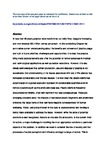Plastics, the Environment and Society: Current Consensus and Future Directions
| dc.contributor.author | Thompson, Richard | |
| dc.contributor.author | Pahl, Sabine | |
| dc.date.accessioned | 2019-04-04T22:16:08Z | |
| dc.date.available | 2019-04-04T22:16:08Z | |
| dc.date.issued | 2018-11-23 | |
| dc.identifier.isbn | 9781788012416 | |
| dc.identifier.uri | http://hdl.handle.net/10026.1/13645 | |
| dc.description.abstract |
<jats:p>In less than 60 years, plastics have transformed our daily lives. Usage is increasing and now exceeds 330 million tonnes per annum. In this concluding chapter we summarise current understanding about the benefits and concerns of plastics usage and look to future priorities, challenges and opportunities. It is clear that plastics bring many societal benefits and offer the potential for further advances in medical and technological applications, as well as carbon reductions. However, it is also widely acknowledged that current production, use and disposal of plastics is not sustainable. Our understanding of the issues associated with end of life plastics has increased considerably over the last decade. It is now clear that plastic debris has accumulated on a global scale and is present in considerable quantities even in remote locations such as the arctic and deep sea. Plastic debris is frequently encountered by wildlife, often with harmful if not fatal consequences. There are emerging concerns about the impacts of nanosized plastic fragments and preliminary evidence that large items of litter can have negative consequences for human wellbeing. Public and policy interest in the topic is unprecedented and funding is being made available to address the issue. However, while the suite of potential solutions is well recognised, there is no one size fits all solution. In the current thirst for action, a major challenge is matching the most appropriate solutions to particular aspects of the problem. In addition, we need to consider the role of society and the processes of social perception and influence amongst a range of actors. This is critical because, unless the efficacy of solutions is properly evidenced and understood, there is a significant risk that interventions taken in haste will not be socially acceptable and/or may lead to unintended negative consequences.</jats:p> | |
| dc.format.extent | 177-187 | |
| dc.language.iso | en | |
| dc.publisher | The Royal Society of Chemistry | |
| dc.title | Plastics, the Environment and Society: Current Consensus and Future Directions | |
| dc.type | book | |
| plymouth.volume | 2019-January | |
| plymouth.publication-status | Published | |
| dc.identifier.doi | 10.1039/9781788013314-00177 | |
| plymouth.organisational-group | /Plymouth | |
| plymouth.organisational-group | /Plymouth/Faculty of Health | |
| plymouth.organisational-group | /Plymouth/Faculty of Science and Engineering | |
| plymouth.organisational-group | /Plymouth/Faculty of Science and Engineering/School of Biological and Marine Sciences | |
| plymouth.organisational-group | /Plymouth/REF 2021 Researchers by UoA | |
| plymouth.organisational-group | /Plymouth/REF 2021 Researchers by UoA/UoA04 Psychology, Psychiatry and Neuroscience | |
| plymouth.organisational-group | /Plymouth/REF 2021 Researchers by UoA/UoA04 Psychology, Psychiatry and Neuroscience/UoA04 Psychology, Psychiatry and Neuroscience MANUAL | |
| plymouth.organisational-group | /Plymouth/REF 2021 Researchers by UoA/UoA07 Earth Systems and Environmental Sciences | |
| plymouth.organisational-group | /Plymouth/Research Groups | |
| plymouth.organisational-group | /Plymouth/Research Groups/Centre for Brain, Cognition and Behaviour (CBCB) | |
| plymouth.organisational-group | /Plymouth/Research Groups/Centre for Brain, Cognition and Behaviour (CBCB)/Behaviour | |
| plymouth.organisational-group | /Plymouth/Research Groups/Institute of Health and Community | |
| plymouth.organisational-group | /Plymouth/Research Groups/Marine Institute | |
| plymouth.organisational-group | /Plymouth/Users by role | |
| plymouth.organisational-group | /Plymouth/Users by role/Academics | |
| plymouth.organisational-group | /Plymouth/Users by role/Researchers in ResearchFish submission | |
| dc.rights.embargoperiod | Not known | |
| rioxxterms.versionofrecord | 10.1039/9781788013314-00177 | |
| rioxxterms.licenseref.uri | http://www.rioxx.net/licenses/all-rights-reserved | |
| rioxxterms.type | Book |


